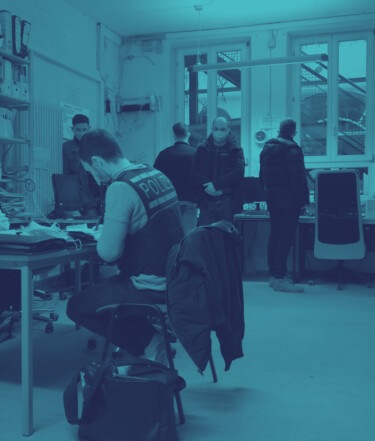
Freedom of the press study
A financially struggling press landscape faces a rising group of media lawyers. Our study examines the potential impact on press freedom.
A study published by the GFF jointly with the Otto Brenner Foundation examines preventive advocacy strategies vis-à-vis the media. The study "If you write this, I'll sue you!" ( in German, PDF) was written by Dr. Tobias Gostomzyk, TU Dortmund University, and Daniel Moßbrucker, PhD student and freelance journalist. For the multi-perspective study, more than 40 journalists, 20 leading press lawyers, in-house counsel from more than 20 media companies, and numerous lawyers specializing in copyright and media law were interviewed.
A BRIEF OVERVIEW OF THE RESULTS OF THE STUDY:
PREVENTIVE LAWYER STRATEGIES
Press law is essentially designed to be repressive: action can only be taken against a report after the fact. Nevertheless, lawyers are increasingly trying to prevent or influence the content of forthcoming reports by means of preventive measures. On the one hand, this is due to the fact that the increasingly digitalized media content is disseminated quickly online and is difficult to catch in retrospect. There are also economic reasons, because press lawyers use preventive instruments to tap into a new market for press law advice.
Preventive instruments can be divided into "hard" and "soft" measures. The former include press law information letters warning against the adoption of reporting from other media. Such letters are mainly used against tabloid media. Warning letters are also used to give journalists a first-time warning in the case of imminent reporting. In the investigative field, on the other hand, lawyers tend to rely on communicative and cooperative measures. Here, for example, alternative information is offered for exchange or stories are passed on to other media with a different spin that is more positive for those affected.
JOURNALISTIC HANDLING OF PREVENTIVE ADVOCACY STRATEGIES
It has long been commonplace for editorial departments to come into contact with press lawyers before and after publication. In many cases, information and warning letters remain ineffective, especially against investigative journalists, or lead to more intensive research and legal protection. This has strengthened the role of in-house lawyers within the media. The study shows that investigative journalists are more willing to make changes to the content if those affected seek dialogue, i.e. if communicative and cooperative measures are chosen.
Moreover, the media are more willing than in the past to issue a cease-and-desist declaration and to correct the article or remove it from the web, especially if the other party waives its right to reimbursement of costs.
LACK OF LITIGIOUSNESS ENDANGERS FREEDOM OF THE PRESS
While lawyer information and warning letters do not necessarily intimidate individual journalists, the publishers behind them tend to be less willing to fight disputes in court today. The correction or removal of an online article after receiving a warning letter is just as common as a quick settlement in court.
In view of the economic situation of many press publishers, this may seem sensible in individual cases, but over the long term it is a worrying development for press freedom. If the media do not fight for their legal position in borderline cases, there is a high probability that the rights of those affected will gradually be unilaterally strengthened in relation to freedom of opinion and freedom of the press.
SOLUTION APPROACH: SELF-COMMITMENT BY THE MEDIA
The authors make recommendations for action on how to deal effectively with legal pressure. These include a voluntary commitment by public-sector clients in particular to assume the cost risk of legal disputes, especially for investigative journalists. The authors also recommend improved journalistic training and continuing education in dealing with new legal strategies.
In order to counter the problem of inadequate administration of justice, the authors recommend a voluntary commitment on the part of the media: legal conflicts of fundamental importance should be reported to a committee, which would then examine individual cases to determine their significance for the continuation of freedom of opinion and freedom of the press. In this way, model cases could be identified and, if necessary, legal advice and financial support could be provided so that they could be clarified by the highest courts. For example, a fund could be set up to cover the costs. In addition, there would still be the option of a quick and inexpensive settlement in cases that are not of fundamental importance.
We would like to thank the Otto Brenner Foundation for its cooperation and support of this study.



